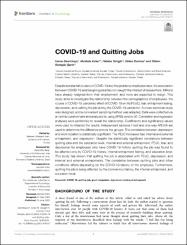COVID-19 and Quitting Jobs
Özet
Despite substantial studies on COVID-19 and the problems employees face, the association
between COVID-19 and resigning jobs has not caught the interest of researchers. Millions
have already resigned from their employment, and more are expected to resign. This
study aims to investigate the relationship between the demographics of employees, the
course of COVID-19, perceived effect of COVID-19 on life (PEoC), fear, entrapment feeling,
depression, and quitting the job during the COVID-19 pandemic. A cross-sectional study
was designed, and a convenient sampling method was adopted. Data were collected via
an online questionnaire and analyzed by using SPSS version 26. Correlation and regression
analyses were performed to reveal the relationship. Coefficients and significance values
were used to interpret the results. Independent samples t-test and one-way ANOVA are
used to determine the difference across the groups. The correlation between depression
and work location is statistically significant. The PEoC increases fear, internal and external
entrapment, and depression. Despite the statistically significant correlations between
quitting jobs and the education level, internal and external entrapment, PEoC, fear, and
depression for employees who have COVID-19 history, quitting the job was found to
be affected only by COVID-19 history, internal entrapment feeling, and education level.
This study has shown that quitting the job is associated with PEoC, depression, and
internal and external entrapments. The correlation between quitting jobs and other
conditions differs depending on the COVID-19 history of the employee. Furthermore,
quitting the job is being affected by the coronavirus history, the internal entrapment, and
education level.
Cilt
13Bağlantı
https://hdl.handle.net/11363/6116Koleksiyonlar
Aşağıdaki lisans dosyası bu öğe ile ilişkilidir:


















